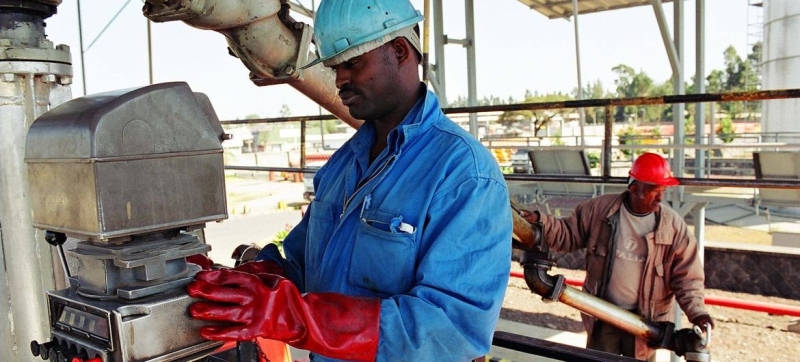- Bangladesh embrace agroecology to combat chemical overuse: Experts |
- China warns Japan after ‘red line’ crossed on Taiwan |
- Capital market rebounds on week’s first trading day |
- Earthquake: Bangladesh Fire Service issues 8 safety guidelines |
- Dry fish trade keeps Narail economy moving in winter |
Global Summit Urges Industry Action on Major Crises

Workers undertake tasks at an industrial plant in Ethiopia.
Leaders from around the world are debating how industry can help tackle some of today’s most urgent challenges – from climate change and food insecurity to the need for fairer supply chains – at the Global Industry Summit, which opened on Sunday in Riyadh, Saudi Arabia.
“Industrial development is critical to strengthening economies, fighting poverty, and creating jobs and prosperity,” declared UN Secretary-General António Guterres in a message delivered by the senior UN official in Saudi Arabia, Mohamed El-Zarkani.
Lifting the Burden of Poverty
Delegates from governments, the private sector and civil society have gathered in the Saudi capital for the week-long event at a delicate time for struggling economies, as several wealthy nations have cut their development aid spending. The COP30 Climate Conference, which ended on Saturday, highlighted the scale of the climate crisis, an existential threat for some nations, particularly Small Island Developing States.
Mr Guterres urged governments and businesses to join forces to ease these burdens by scaling up sustainable industrialisation — adopting cleaner, resource-efficient technologies, upgrading infrastructure, and ensuring that industrial development does not impose undue social or environmental costs. This aligns with the recommendations of the Pact for the Future, the UN’s blueprint for international cooperation, peace and development.
The summit also serves as the 21st General Conference of the United Nations Industrial Development Organization (UNIDO), which is dedicated to promoting inclusive and sustainable industrial development that reduces poverty, enhances competitiveness and supports environmental sustainability in developing countries.
Discussions at this year’s conference, UNIDO’s highest decision-making body, will focus on three main themes: reducing emissions and strengthening renewable energy; ending hunger through agro-industrial innovation; and building sustainable supply chains that ensure trade benefits workers, communities and the environment.
Addressing delegates on Sunday, Gerd Müller, the Director-General of UNIDO — re-elected for a second four-year term — called on wealthier nations to do more to combat inequality. “The wealthy nations, the industrialized countries, the oil states, we must live up to our global responsibilities,” he said, noting that they have still not fulfilled their 30-year-old pledge to allocate 0.7 per cent of their annual budgets to overseas development aid.
Mr Müller said it was time for a “New Global Fair Deal,” in which developing countries gain better access to the world financial system and, in a pointed reference to recent US policies, zero-tariff access to major markets.
Cuts Are ‘Nothing Less Than a Death Sentence’
Meanwhile, in South Africa, the leaders of the world’s foremost economies are meeting at the annual G20 summit. Mr Müller appealed directly to them to reverse funding cuts of up to 40 per cent to UN aid agencies, including the World Food Programme (WFP) and the World Health Organization (WHO).
“This is nothing less than a death sentence for millions of children, refugees and people living in the world’s crisis areas who depend on humanitarian assistance,” the UNIDO chief warned.

